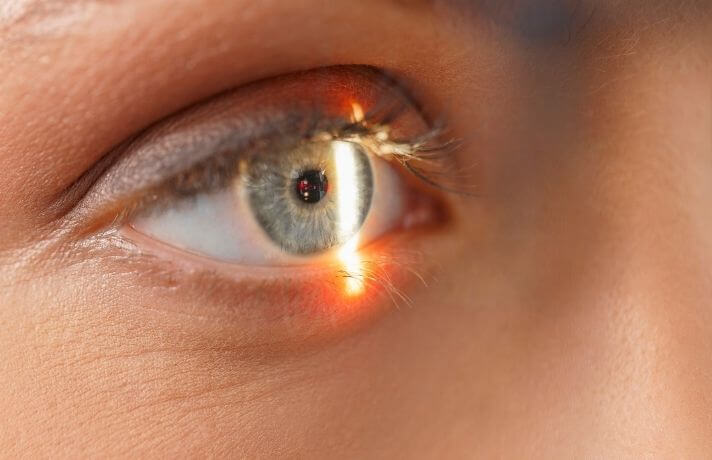
Retinal vein occlusions are the result of a blockage in a retinal vein resulting in sudden painless loss of vision.
What is retinal vein occlusion?
The retina is the thin layer of light sensitive cells that line the inner surface of the back of your eye like a film in a camera onto which images are focused. When one of the veins draining blood out of the eye is blocked this can lead to fluid and blood leaking into the retina.
Branch retinal vein occlusion result from blockage off one of the four retinal vein supplying a portion of the retina. Central retinal vein occlusions usually cause more severe vision loss as they result from a blockage of the central vein that forms from the union of the four branch veins.
Retinal vein occlusions can result in:
- Macular Oedema – fluid and swelling of the centre of the retina which causes blurry distorted vision
- Abnormal growth of new fragile blood vessels which can potentially bleed in the eye
What are the symptoms of retinal vein occlusion?
Retinal vein occlusions result in painless reduction in vision. The symptoms depend on the extent of the vein occlusion (branch/central), and can worsen over time or sometimes improve on their own. These ranging from:
- small blurry patches in vision
- more extensive decrease in vision with distortion
- floaters
What causes retinal vein occlusion?
Retinal veins can be blocked by a blood clot or fatty deposits; they can also result from compression by an adjacent hardened retinal artery. Retinal vein occlusions are a relatively common cause of vision loss in patients in the UK and are more common after the age of 60. Risk factors include:
- High blood pressure
- Diabetes
- High cholesterol/lipid levels
- Glaucoma
- Smoking
- Rarer conditions which cause the blood to be thicker
How is retinal vein occlusion diagnosed?
If you think you may have retinal vein occlusion, speak to one of our ophthalmology consultants. After dilating your pupils with eyedrops in order to obtain a view of the back of your eye, an ophthalmologist will closely examine your retina with a slit-lamp microscope in clinic.
You will also have an OCT (optical coherence tomography) scan which takes a 3-dimensional cross-sectional image of the retina to determine the extent of swelling in the retina and help determine treatment.
Sometimes more specialised tests such as an angiogram (picture of the retina taken once contrast dye is injected into a vein) may be arranged, although quite often this is being replaced with newer scanning technology such as OCT-angiography.
How is retinal vein occlusion treated?
The risk factors must be treated together with your physician/GP to ensure that this does not recur in either eye and that your cardiovascular risks are addressed.
Swelling of the retina (macular oedema) is the main factor responsible for reduced vision. Treatment options will be discussed with you and may consist of:
- Anti-VEGF (Vascular endothelial growth factor) injections into the eye such as Eylea, Lucentis or Avastin
- Steroid implant injections into the eye such as Ozurdex
- Laser to part of the retina in certain types of vein occlusion
Some patients who develop fragile new blood vessels growing in the retina may require more extensive laser treatment to prevent bleeding. You will need regular follow-up to ensure that the complications of retinal vein occlusions can be monitored and treated.
If you’re unsure what treatment you should go for, or the above treatments don’t work for you, our team of expert specialists are here to help.










